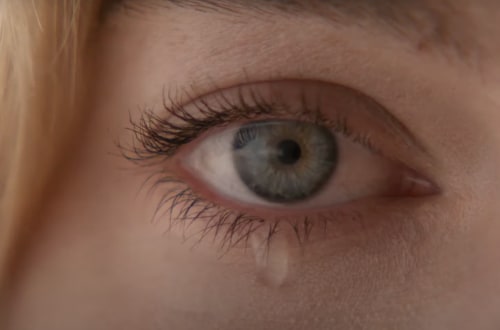
Recall that the opening scene of Margot Robbie’s and Greta Gerwig’s Barbie is set in a sepia-toned landscape somewhere in the timeless past that might be the Depression era or some sci-fi Stone Age. Girls in traditional Americana garb are playing with their dolls, having tea parties, ironing clothes.
Helen Mirren, in voice-of-Goddess mode, speaks: “Since the beginning of time, since the first little girl ever existed, there have been dolls. But the dolls were always and forever babydolls.
“The girls who played with them could only ever play at being mothers. Which can be fun—at least for a while, anyway. (Ask your mother.)
“This continued until … ” and the music swells, and yes, it is the theme from 2001, A Space Odyssey. And the magnificent Robbie-as-Barbie appears in place of Stanley Kubrick’s obelisk, seemingly 30-feet tall, in a black-and-white-striped swimsuit (and, of course, high-heels). And as the camera zooms in for a close-up, she lowers her stylish sunglasses, and winks.
‘The opening scene is a brutal and hilarious enactment of the violent beginning of the end of the patriarchy.’
This scene became instantly famous for its reference to Kubrick, but what happens next is even more interesting. A bespeckled seven-year old lifts her baby doll over her head by its ankles and uses it to smash her little make-believe tea set. She hoists the doll again, and brings it down on the skull of its little sibling, shattering it. Immediately, all her little friends are destroying their dolls, their play houses, their doll carriages. It’s a brutal and hilarious enactment of the violent beginning of the end of the patriarchy, and introduces what I would argue is the best movie of 2023.
Here are five reasons Barbie deserves a statue.
It is a revolutionary feminist blockbuster that arrived at the perfect time.
From now on, uncountable girls will be introduced to the idea that they live in a world in which men subjugate women. They will hear how this impacts women in an Oscar-worthy speech by America Ferrara’s Gloria. And they will receive this important piece of truth while they are experiencing a joyous fun-ride of cinematic spectacle.
The defenders of the status quo who attack this movie as dangerous propaganda—in the exact historic moment when they are depriving women of their rights—are correct. Barbie is a powerful weapon in the campaign for equality and justice for women.
Like the best of Hollywood movies, Barbie works on the level of myth.
M.G. Lord, author of Forever Barbie: The Unauthorized Biography of a Real Doll (1994), speaks of Barbie’s “mythic resonance,” pointing out that the toy’s universal adoption gives Barbie special power. “She’s kind of the feminine essence,” Lord says. “She’s like a goddess archetype— a Space Age recasting of a Stone Age fertility totem.”
‘She’s like a goddess archetype— a Space Age recasting of a Stone Age fertility totem.’
Just as the Barbie doll is a “cultural touchstone,” in Lord’s words (with 99 percent brand awareness globally), Barbie the movie has made history—despite or because its makers put this icon to such revolutionary use. The Academy should recognize that, IMHO.
Barbie is an existential study of what it means to be a woman—that any teenaged girl can understand.
Let’s review the plot line. Experiencing a sense of dread when she notices her body changing, Barbie has thoughts of mortality, and is unable to continue living in a perfect plastic world. Seeing the real world for the first time she chooses its complexity over the simplicity and safety of Barbieland. She has a heart-to-heart talk with her "mother," and makes a difficult decision.
A coming-of-age story disguised as a toy story, Barbie can be seen as the third in the unofficial Greta Gerwig trilogy. As she did in Lady Bird and Little Women, Gerwig risks sentimentality in order to go deep in her exploration of the female heart, which is to say the human heart.
The plot is as profound as it is simple, just like the brilliant lyric to Billie Eilish’s What Was I Made For: “I don’t know how to feel, but someday I might.”
This collaboration between producer/star and co-writer/director is unprecedented.
Barbie is Margot Robbie’s movie just as much as it is Greta Gerwig’s—and not because stars are more importanat than directors. As producer, it was Robbie who convinced Mattel to let her make the movie in the first place. She convinced the company’s managers that the film would deal head-on with the feminist critique, and would not focus exclusively on the “Stereotypical Barbie,” instead featuring a multiplicity of Barbies. And it was Margot Robbie who convinced Greta Gerwig to write and direct the film.

Barbie is making change in the Real World.
While some of Barbie’s supporters were complaining about the perceived snub of Gerwig and Robbie, the star and producer chose instead to celebrate the film’s obvious social victory. “We set out to do something that would shift culture, affect culture, just make some sort of impact, and it’s already done that and then some—way more than we ever dreamed it would,” Robbie said.” That is truly the biggest reward that could come out of all of this."
Editor's Note: THis article first ran under the headline: "Why 'Barbie' Deserves a Best Picture Oscar